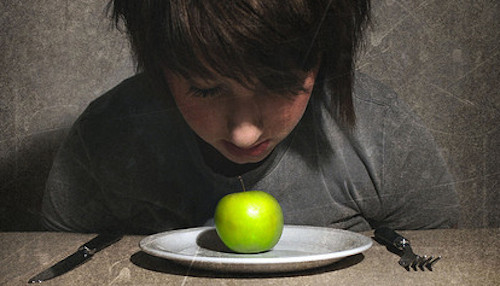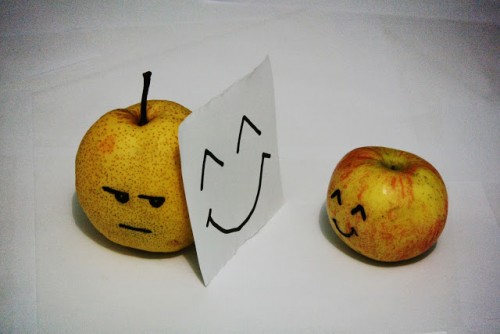Orthorexia Nervosa is like a mosquito that bites you in the middle of the night, right in-between the toes—right where it really hurts.
The National Eating Disorder Association doesn’t even recognize it as a real eating disorder, but it was very real to me, and I assume it is also very real to many others.
I never knew I had a problem until my shoes were already on, and I was walking down the street, my toes screaming to be scratched, but I could never step in the right way to satisfy the itch.
Sooner or later, I would have to take the shoe off.
Orthorexia is different from Anorexia in a small way—it isn’t about getting skinny. It stems off of a basic human desire to be healthy.
It started with nothing more than some good old fashion protest from a much younger, much more angsty teenaged me.
My mother bought a cow (well, a steer, really), as farmers do in rural New Jersey, and named it Fuzzy. The reason we bought Fuzzy was so we could raise him and eventually slaughter him for organic meat for our family.
(This is something that, as an adult, I am an advocate for, what with all of the NO-GMO hubbub I keep up with.)
Anyway, he was a cute little baby steer. I fed him with a bottle, he sucked on my fingers with his pathetic little nubby gums, and I looked him straight in the eyes and told him: That’s it. I will never eat red meat again.
And I haven’t since.
I started getting a lot of attention as a teenager for my body. I had always been thin and short, sort of stringy like my muscles were hardened taffy, but when I grew into my body it did me many favors.
My metabolism is fast, my waist is small and my butt is big. Thank you genetics. I never had to work out or needed a diet.
This drove my friends crazy. I could eat anything and not gain a single ounce.
They’d say,
“Eventually, it’ll catch up to you. You’ll weigh more than 90 pounds after you have kids, trust me.”
Despite the fact that I had to try on every size zero prom dress in the store, and despite shopping in the extra small section all alone, I got through the jealous teasing because I still had this body, and I didn’t even have to try.
Don’t fix something that isn’t broken, right? Well, sort of.
I became a little obsessed with what I was eating.
I was the first vegetarian in my group of friends (starting in middle school around the time of the Fuzzy incident), and I was the only one to stick to it. I had cut out all red meat, and a few months later, all poultry entirely, cold turkey. (Pun intended.)
I always ate fish, and for a while chicken was okay, because I was convinced that these animals didn’t know suffering, so it was alright to eat them.
(Chickens didn’t get a saying about their heads getting cut off for no reason.)
The first red flag was Anemia. I had never been anemic as a kid. Cutting that much protein out of your diet so quickly can be really dangerous.
Luckily, I had the cure for that. Tofu! Beans!
It wasn’t enough, but for my mind, it was already too much. I had stopped eating breakfast, simply because I usually ate eggs and bacon. Bagels or toast were empty carbs I would have to carry through the day with me.
You know what they say, if you eat too many doughnuts, your middle starts to take their shape.
It’s one thing to say protein is easy to find, it’s another to actively weave it into your new diet. It crept in slow, like the first few days of sneezing before a sinus infection.
I liked the way this control made me feel.
My greatest fear quickly changed from dead people to fat people.
I was eating very little at school (who knows what’s in school lunches), and very little when I got home (I ate a big lunch at school), just to make sure that I wasn’t sleeping with any extra carbs or calories.
I didn’t bother with any dietary research, I just kept it to myself. I ate small dinners so that nobody would know what I was up to. I loved the control, the way it made me feel to be skinny, and to be hollow.
Then the NO-GMO revolution happened, and I truly went off the deep end.
I moved away from home and started buying my own groceries. I downloaded a diet app to my phone and meticulously added and searched for all of the calories that I would ingest throughout the day.
If the food didn’t have the NO-GMO tag on it, I didn’t buy it.
I wouldn’t buy non-organic vegetables, which I was basically living on at that point. I would come home from work and make a small plate of vegetables, punch in the calories, and eat half.
There was a time where I was only eating 800 calories worth of food a day.
After a few months of using the app, it was easy to eyeball food and know that the calorie intake wasn’t “dangerous” and I could have a nibble. This is how I lived for four years.
I never really caught it, never knew there was anything wrong, until I stepped on a scale at the age of 21 and the number that faced me was 98.
I hadn’t been 98 pounds since I was 14, as far as I knew.
That was the thing—I wasn’t anorexic, I didn’t have a problem with my weight.
The thing that really scared me was that when I saw that number on the scale it didn’t make me feel like I had accomplished anything. It made me happy, but what I was thinking was far worse than pride.
I was wondering what I had eaten in the past week so that I could replicate it and keep this weight.
I started seeing a therapist for other reasons, and when food came up in conversation I got quiet. This wasn’t my style (he knew that), the talk-it-out system is my favorite treatment process, but I couldn’t let him touch that.
I’m not anorexic, look at me. I mean, I’m not huge, but I’m not boney either.
(That wasn’t true, I was just very good at hiding it with baggy clothes.)
I’m not bulimic, I hate throwing up.
He said,
“Still, there is a problem with food, isn’t there?”
I started to cry. I guess I always knew that there was.
If I have any advice for somebody suffering like I did, it’s this:
I know it isn’t completely about being beautiful, or about being “healthy,” or right or wrong. I know that this control you have over yourself is a power struggle.
Outside influences aren’t helping either, are they?
You never know what you’re eating, who is lying, who is telling the truth. There’s puss in whole milk and the steroids in the chickens are screwing with our hormones; there is plenty of sensationalized propaganda to leave you crouched in front of the fridge, staring into the abyss, until finally, you close the door and eat nothing.
You just want what is right for you.
But obsessing about what you eat, and about dieting, and the perfect weight are all unhealthy habits that can really screw with your body.
You’re putting yourself in danger of hypoglycemia, anemia, liver problems and thyroid disorders—not to mention what lack of nutrition does to your brain.
There is a line, and when you cross it, you need to get yourself back to the other side.
In the end, it just isn’t worth it.
I still have my moments. I started with trying to identify foods that made me happy. Pizza, sushi and avocados are a few. There aren’t many foods on the list, I still only eat fish as protein, but I also go out of my way to eat beans and tofu instead of just saying I did to get my mother off of my back.
I like to say that I don’t like sweet things, a deflection from empty sugars, but now and again, I allow myself a doughnut or an apple turnover.
I have stopped my usual tricks.
Verbalizing a food I really wanted but backing out last second and ordering a salad instead; the baggy dresses and sweaters; the “push the food around until it looks finished enough” routine.
It was really hard.
I don’t see a fat person when I look in the mirror now, or a skinny one, or a beautiful woman, or an ugly one.
I don’t see how many calories I eat in a day.
Now, I like to look in the mirror and remind myself that what I am seeing is me. A stronger, less hungry, less nervous, less emaciated, me.
The shoe is off. Now, it’s time for a band aid.
Relephant:
Obsession with Nutrition—When Healthy Eating is too Much.
Author: Jazz Unruh
Apprentice Editor: Brandie Smith/Editor: Emily Bartran
Photos: daniellehelm/Flickr, Ilham Imran/Pixoto







Read 0 comments and reply